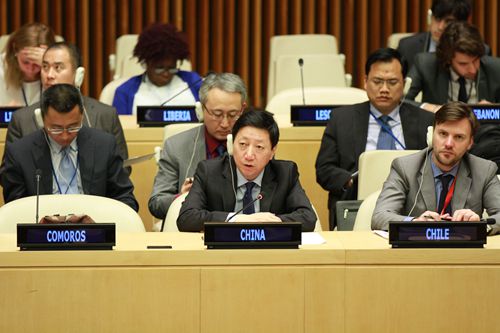| Statement by Ambassador Wu Haitao at the 27th Meeting of States Parties to the United Nations Convention on the Law of the Sea under Agenda Item: Report of the Secretary General |
| 2017-06-15 09:57 |
|
Madam President, The Chinese delegation would like to thank the Secretary General for his report submitted pursuant to Article 319 of the United Nations Convention on the Law of the Sea (UNCLOS). Our thanks also go to the Secretariat for their hard work. China would like to make the following remarks: First, we should promote the sustainable development of the oceans and seas by fostering the sense of a community of shared future for mankind. The ocean is our shared home. Alongside the advances in science and technology, a greater abundance and diversity of marine resources can be developed and utilized. On the other hand, as highlighted in the Secretary General’s report, formidable challenges to oceans and seas have emerged, such as sea level rise, ocean acidification and pollution of the marine environment. Balancing between ocean exploitation and ocean protection to realize sustainable marine development requires international synergy. Last week’s United Nations Ocean Conference adopted an outcome document “Call for Action”, which is a roadmap for the implementation of SDG 14 of the 2030 Agenda for Sustainable Development. In May this year, the “Belt and Road Forum for International Cooperation” took place in Beijing. It lent new impetus to the 21st Century Maritime Silk Road Initiative and to international cooperation in ocean-related activities. The Belt and Road Initiative fits in seamlessly with the philosophy of sustainable development of the oceans and seas. It behooves us to foster the sense of a community of shared future for mankind, uphold the principle of wide consultation, joint contribution and shared benefits, and effectively promote the sustainable development of the oceans and seas through joint planning and coordinated action while accommodating the interests and concerns of all parties. Second, we should facilitate the establishment of a fair and reasonable maritime order through adherence to the purposes and principles of UNCLOS. The Convention provides in a balanced manner for the rights and obligations of countries in various maritime zones, thus creating a comprehensive legal framework for maritime activities. All parties should respect the principles and spirits as well as the legislative intent of the Convention and correctly interpret and apply the provisions of the Convention. China attaches importance to the responsibilities and roles of the three bodies under the Convention, namely, the International Tribunal for the Law of the Sea (ITLOS), the Commission on the Limits of the Continental Shelf (CLCS) and the International Seabed Authority (ISA), in maintaining maritime order and promoting the development, utilization and protection of marine resources. We would like to see the three bodies fulfilling their responsibilities within the purview of their respective mandates. This year, China will continue to contribute to the relevant trust funds for CLCS and ISA to facilitate the participation of commission members and experts from developing countries. Third, we should conduct ocean-related consultations on the basis of consensus and develop ocean-related new rules in a progressive manner. The ongoing negotiations on an international legally binding instrument on the conservation and sustainable use of marine biodiversity in areas beyond national jurisdiction (BBNJ) are an important international legislative process. During the previous three sessions of the PrepCom, certain consensus was reached on a range of important issues, such as marine genetic resources, marine protected areas, environmental impact assessment, capacity building and transfer of technologies, but there remain a good number of pending issues. Come July, at PrepCom IV, China is ready to continue strengthening cooperation with all parties to move the consultations forward. We see this process as essential for the optimization of global governance of oceans and seas, it therefore follows that the consultations must proceed in a stepwise, gradual manner and every effort should be made to reach outcomes by consensus. This applies also to ISA’s ongoing development of the draft exploitation regulations. In our view, only when the relevant international instruments have been fully discussed and consulted upon, only when the interests and concerns of all parties have been accommodated, can they be accepted by the international community and eventually become universal instruments enjoying broad participation of the majority of States. Madam President, President Xi Jinping of China, in his address to the Belt and Road Forum for International Cooperation referred to earlier, noted (and I quote): “We have every reason to draw wisdom and strength from the ancient Silk Road, advance cooperation in the Silk Road spirit of peace and cooperation, openness and inclusiveness, mutual learning and mutual benefit, and work together to build an even brighter future.” (Unquote) China looks forward to joining hands with the rest of the world in the Silk Road spirit to address the multiple challenges facing the oceans and seas, so the whole world can share in the precious fruits of development and utilization of marine resources. Thank you, Madam President. |
| |||||||||||||
| |||||||||||||
